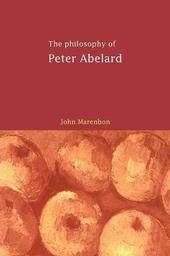
|
The Philosophy of Peter Abelard
Paperback / softback
Main Details
| Title |
The Philosophy of Peter Abelard
|
| Authors and Contributors |
By (author) John Marenbon
|
| Physical Properties |
| Format:Paperback / softback | | Pages:396 | | Dimensions(mm): Height 229,Width 152 |
|
| Category/Genre | History of Western philosophy |
|---|
| ISBN/Barcode |
9780521663991
|
| Classifications | Dewey:194 |
|---|
| Audience | | Professional & Vocational | | Tertiary Education (US: College) | |
|---|
| Illustrations |
Worked examples or Exercises
|
|
Publishing Details |
| Publisher |
Cambridge University Press
|
| Imprint |
Cambridge University Press
|
| Publication Date |
23 September 1999 |
| Publication Country |
United Kingdom
|
Description
This book offers a major reassessment of the philosophy of Peter Abelard (1079-1142) which argues that he was not, as usually presented, a predominantly critical thinker but a constructive one. By way of evidence the author offers new analyses of frequently discussed topics in Abelard's philosophy, and examines other areas such as the nature of substances and accidents, cognition, the definition of 'good' and 'evil', virtues and merit, and practical ethics in deatil for the first time. Part I discusses Abelard's life and works, and considers problems of chronology and canon (including the question of the authenticity of the correspondence with Heloise). Part II analyses Abelard's ontology, epistemology and semantics, showing how he tried to reconstruct the ideas he had learned from Aristotle, Porphyry and Boethius to fit his presumption that there is nothing which is not a particular. Part III analyses Abelard's ethical theory, showing that it is far wider and more sophisticated than has been believed.
Reviews'... most satisfying to read, combining a clear sense of purpose with an exemplary clarity of thought. It is difficult to overestimate its importance for the study of Abelard and of twelfth-century intellectual culture in general.' Early Medieval Europe '... not only an outstanding exposition of Abelard's philosophy, but a work that opens up for specialists and non-specialists the world of twelfth-century thought.' The Times Literary Supplement
|